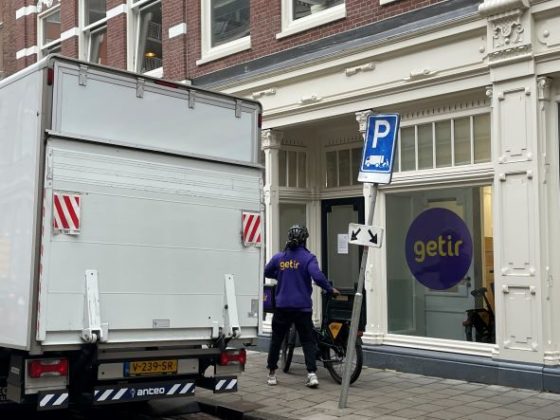Fast delivery firm orders begin to ‘stagnate’: ABN Amro


The ‘boisterous’ growth of super-fast delivery companies is beginning to stagnate, according to market analysis by ABN Amro.
The bank has analysed transaction data to show that although the four start-ups Gorillas, Getir, Zapp and Flink did huge amounts of business – peaking in the January lockdown – the number of daily transactions has since declined.
The companies, which are funded by venture capital, promise to deliver all kinds of shopping within minutes, often using electric bikes and city-centre locations as warehouses for everything from fresh food to dog food.
Lockdowns
According to ABN Amro, they were taking just a few transactions a day in January 2021, but peaked in popularity in the weekend of 21st January this year.
‘They benefited from the lockdowns,’ ABN Amro economist Gerarda Westerhuis told NOS. ‘During the mandatory closure of bars, restaurants and cafes, a relatively large amount of snacks and alcoholic drinks were ordered from fast delivery companies.’
The amount spent per order is estimated to be an average of €16.88 per customer. Market researcher Gfk has predicted that the fast delivery firms will take €500 million in turnover this year, and the FoodService Instituut Nederland expects that the market for delivery will grow by 5% to 10%.
Pressure
As the global economic outlook worsens, however, the loss-making firms have recently encountered pressure from investors to make money, and have announced job losses. Getir has announced it will sack around 4,400 employees, 14% of its staff, Gorillas said around 300 people would lose their jobs and Zapp announced 10% job cuts. It later said it was planning to leave the Dutch market.
Cities have also raised concerns about nuisance caused by warehouses, which are sometimes in largely residential areas, run 24/7 or extended-hours operations, and are frequently supplied with small orders by delivery vans – sparking thousands of complaints from nearby residents.
Amsterdam and Rotterdam have announced a freeze on new openings, Amsterdam is drawing up tough rules to ban the warehouses from residential and mixed-use areas, and there have been court cases in Leiden and Amsterdam to fight enforced store closures. On Monday, Getir claimed that a warehouse in De Pijp which had been ordered to close had transformed into a supermarket, in the model of Tool Station stores or a bakery. A verdict is expected by July 18.
Thank you for donating to DutchNews.nl.
We could not provide the Dutch News service, and keep it free of charge, without the generous support of our readers. Your donations allow us to report on issues you tell us matter, and provide you with a summary of the most important Dutch news each day.
Make a donation